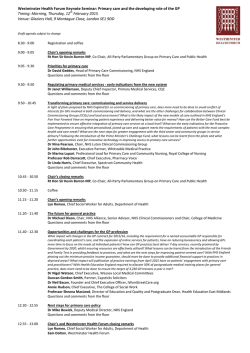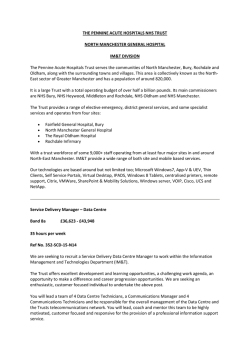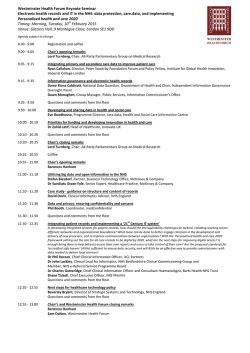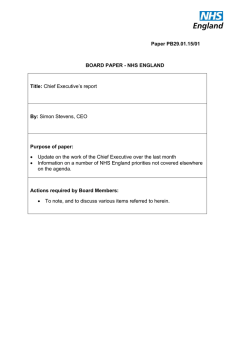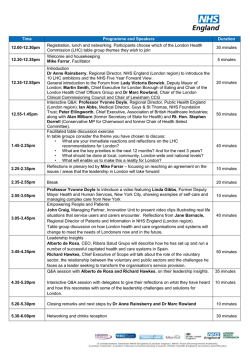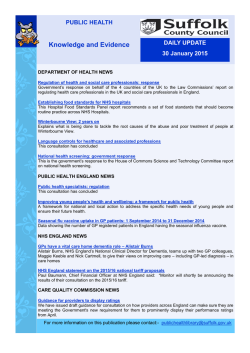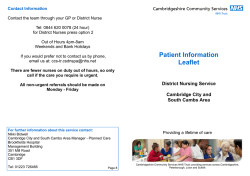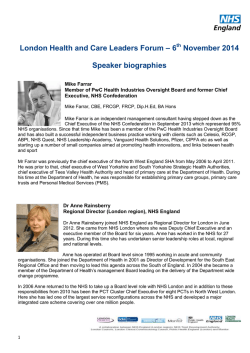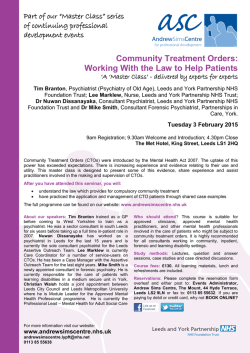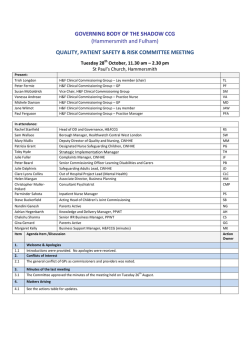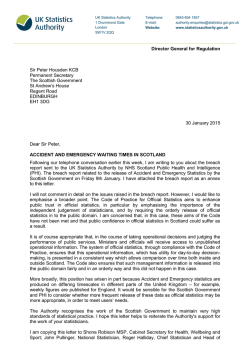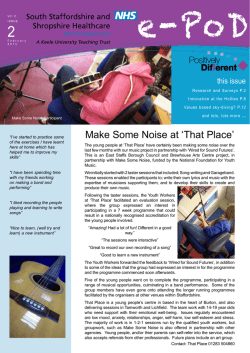
Professor Sir
NHS England Minutes of the Board meeting held in public on 17 December 2014 Southside, London at 10.15am Present: Professor Sir Malcolm Grant Simon Stevens Ed Smith Lord Victor Adebowale Professor Sir John Burn Margaret Casely-Hayford Ciaran Devane Dame Moira Gibb Noel Gordon Paul Baumann Jane Cummings Ian Dodge Dame Barbara Hakin Tim Kelsey Sir Bruce Keogh Karen Wheeler Chairman Chief Executive Non-Executive Director and Deputy Chairman Non-Executive Director Non-Executive Director Non-Executive Director Non-Executive Director Non-Executive Director Non-Executive Director Chief Financial Officer Chief Nursing Officer National Director: Commissioning Strategy National Director: Commissioning Operations National Director for Patients and Information National Medical Director National Director: Transformation and Corporate Operations Apologies David Roberts Non-Executive Director In Attendance: Tom Easterling Director of the Chair and Chief Executive’s Office Secretariat: Fiona Barr Head of Corporate Governance and Board Secretary 1.0 1.1 Declarations of Interest in Matters on the Agenda No declarations were made. 2.0 2.1 Minutes of the Previous Meeting The minutes of the meeting held on 06.11.14 were accepted as an accurate record. There were no matters arising. 3.0 3.1 Chief Executive’s Report Simon Stevens drew the Board’s attention to the following key items in his report which would be discussed in detail later in the meeting: i. Allocations: In the Autumn Statement, the Chancellor had announced an additional £1.98bn funding for frontline health services in 2015/16 to help kick start the transformation agenda as set out in the NHS Five Year Forward View. There would be a discussion to agree allocations for 2015/16 later in the meeting. ii. NHS Five Year Forward View: Work continued with partners to deliver the first 12 months. iii. Mandate for 2015/16: The Mandate had been published on 11.12.14 setting out the Government's refreshed expectations of the NHS for 2015/16. The Board welcomed the continuity with the content of the 1 3.2 2014/15 Mandate and noted updates to three objectives to reflect new access and waiting time commitments in mental health, requirements to implement the Better Care Fund and the additional funding announced in the Autumn Statement. iv. Urgent and Emergency Care: The intensive work that was underway across the NHS to ensure timely and appropriate care during periods of high demand over winter. The Board received the report. 4.0 4.1 Planning Guidance for 2015/16 Simon Stevens introduced the report advising that the Forward View into Action: Planning for 2015/16 would be published on 19.12.14. 4.2 Ian Dodge reminded the Board how a number of stakeholders, including Monitor and the NHS Trust Development Authority (TDA), had been closely involved in the production of the Planning Guidance and how its development and assurance of delivery represented a new collaborative approach. 4.3 He emphasised key aspects of the approach including: i. Work to progress the Five Year Forward View in 2015/16 in particular by maintaining a forensic focus on performance and delivery of Mandate objectives. ii. The emphasis on prevention and empowering patients at the heart of the planning requirements. iii. Progressing new models of care by both working closely with “vanguard sites” which were spearheading change as well as the challenged health economies which needed a new approach to kickstart their transformation. iv. Delivering improved outcomes through two new Commissioning for Quality and Innovations (CQUIN) goals in 2015/16 for tackling sepsis and acute kidney illness. 4.4 In further discussion, the Board: i. Acknowledged the need for a significant shift in ways of working to ensure that citizens were involved commissioning decisions. ii. Welcomed the introduction of the NHS Workforce Race Equality Standard in the NHS contract noting the work needed to ensure that this was embedded system-wide. iii. Considered if there was appropriate engagement with the voluntary sector as a significant provider of services. iv. Discussed organisational capacity to support the changes required. v. Received assurance that learning from the vanguard sites would be captured and shared with those health economies facing difficulties. vi. Resolved to consider the implementation of the 2015/16 Planning Guidance at a future meeting. 4.5 The Board: i. Approved the overall approach and the shape of the proposed core content of the Forward View into Action: Planning for 2015/16. ii. Agreed to delegate authority to the NHS England Executive Team to finalise the text of the document. ACTION The Board to consider the implementation of the Forward View into Action: PB.17.12.14 Planning for 2015/16 guidance at a future meeting. /08 LEAD: Ian Dodge 5.0 5.1 Allocations Sir Malcolm Grant introduced the report outlining the context and legal 2 5.2 5.3 5.4 5.5 6.0 & 7.0 6.1 6.2 parameters. It was noted that the decisions regarding indicative allocations made by the Board last year were in place and further decisions needed to be taken regarding the allocation of the additional funding announced in the Autumn Statement. Simon Stevens and Paul Baumann drew the Boards attention to the following key issues: i. The additional £1.98bn allocation meant the NHS would be receiving 1.6% real term growth for 2015/16 which was consistent with the Five Year Forward View. ii. The £1.98bn would be split between frontline services (£1.5bn) and transforming care (£480m). iii. The recommendation to continue with the adjustment to both the Clinical Commissioning Group (CCG) and primary care additional health inequalities funding formulae (of 10% and 15% respectively). iv. The proposal to provide a minimum real terms growth in funding for all CCGs with higher growth for those furthest below target allocations. This would cut in half the number of CCGs more than 5% below their fair funding share. v. The proposal to give a 20% higher uplift for Primary Care Services than the uplift to other locally commissioned hospital and community services. vi. The planning guidance will require CCGs to increase investment in Mental Health Services. vii. A substantial increase of 8.4% for specialised commissioning providers and services. viii. A proposal for £10m additional support for Commissioning through Evaluation. ix. The NHS England internal budget would be cut by 13.7% next year. The Board debated the proposals in detail, in particular considering: i. the principles behind the allocation of the additional funding and the costs and pressures that had been factored into modelling; ii. the allocation of funding within the workstreams. The Board: i. Agreed the proposed allocation of funds between areas of commissioning spend. ii. Agreed the proposed methodologies for allocations to CCGs and primary care teams. iii. Noted the impact of intended changes to commissioning scope and endorsed the approach to supporting these. The Board note that an announcement of the decisions would be made on 19.12.14. Performance Report and Update on NHS Preparedness for Winter 2014/15 Sir Malcolm Grant invited Dame Barbara Hakin to take the Board through the report on Performance in the NHS together with the report on Preparedness for Winter in 2014/15. Dame Barbara drew the Board’s attention to the following within the Performance Report: i. Referral to Treatment (RTT): The Board was advised that an additional £250m had been identified to treat those patients who had been waiting longest during July – November. However the RTT standard had not been achieved as a large number of providers had been unable to deliver the additional activity planned to meet the shortfall. The Board was assured 3 6.3 6.4 6.5 6.6 6.7 ACTION CB17.12.14 /09 8.0 8.1 8.2 8.3 that work was ongoing with the NHS and the independent sector to treat more patients using the additional funding. ii. Cancer and Diagnostics: The dip in the delivery of the standards was noted. This was due, in part, to the number of additional patients being referred following public awareness/education campaigns. iii. Psychological Therapies: The high level of standards set for patient access to therapies was noted along with an improvement in the regularity of and access to data about their use which would enable better monitoring of performance. iv. Ebola: The Board would continue to receive regular reports on the NHS’s preparedness to deal with any cases of Ebola. The Board received assurances that operational teams were focussing on areas of non-delivery and targeting interventions to areas of non-compliance. Dame Barbara clarified the requirements of the emergency care standards advising that the standards had not been met over the last few weeks. She explained that this “whole system” issue and was not limited to Accident & Emergency departments (A&E). She reassured the Board that in circumstances where patients had to wait in excess of four hours before either admission or discharge, providers were focusing on the quality of care provided and patient safety was the prime concern of hospitals. The Board noted the plans in place for resilience over the holiday period and Dame Barbara provided assurances that safe emergency care services were in place and would continue throughout the period. In further discussion, the Board: i. Noted the timeline and assurance processes for local winter resilience plans; ii. Received further assurances regarding accessing mental health services; iii. Asked for an analytical report to a future meeting regarding the increasing attendances and admissions through A&E; iv. Noted that learning and good practice was shared with the services through the Emergency Care Intensive Service Team. The Board received and took assurance from the report and resolved to receive a single report on NHS Performance and NHS Resilience in future and to better understand changes in supply and demand. To produce a single report on NHS Performance and NHS resilience. LEAD: Dame Barbara Hakin Urgent and Emergency Care Review: Progress and Implementation Plan Sir Bruce Keogh updated the Board on the Urgent and Emergency Care Review. He reminded the Board that, on average, most patients waited no more than 50 minutes for treatment in A&E and the vast majority waited no more than four hours; he advised that no other developed nation could match these standards. Sir Bruce reflected that there was now a need to review how Urgent and Emergency Care was delivered in line with changes in demography, technology and medical science. He particularly emphasised the importance of providing access to services seven days a week and meeting the different needs of all groups in society. He outlined the five areas should be addressed to meet expectations: i. Providing more support for self-care. ii. Ensuring access to the right advice when and where needed. This included working with other healthcare professionals, such as pharmacists 4 8.4 8.6 8.7 9.0 9.1 9.2 9.3 9.4 9.5 ACTION CB17.12.14 /10 10.0 10.1 and paramedics together with NHS 111 and digital channels, to harness different skills and enhance choice and service. iii. Extending the response beyond hospitals. iv. Establishing centres of excellence and expertise. v. Building networks which connected urgent and emergency care services – which could increase survival rates by 15%. Sir Bruce drew the Board’s attention to the workstreams outlined in his report explaining that it was vital that each of these was delivered to bring about the required change. He also assured the Board that the timelines for implementation were feasible and that the workstreams had been devised with input from members of the public and key stakeholders. The Board discussed the report and the following issues were raised: i. The actions were being taken to increase the clinical input to NHS 111. ii. Police, paramedics and range of providers working together to deliver improved mental health services in urgent and emergency care. iii. The significant communication with CCGs about the proposals and how they would drive the design and networks. The Board received the report, taking assurance from the work to date and the implementation plans for the next phase of the Urgent and Emergency Care Review. Investing in Specialised Services Dame Barbara set out the context of commissioning Specialised Services. Her paper outlined the principles and method which would underpin the future decision-making process for investments in Specialised Services and sought the Board’s agreement to consult on the key elements of the approach from January 2015. Dame Barbara assured the Board that urgent requests for Specialised Commissioning would continue to be considered during the consultation period and that there would be a clear process for this. However she sought the Board’s view on the length of the consultation period, setting out the pros and cons of both a 90 day and a 30 day process, advising that stakeholders had indicated their preference for a 90 day consultation period. The Board considered the content of the report and debated the length of the consultation period opting for a longer period given the number of stakeholders who would be keen to comment and the request from at least one patient group for a 90 day consultation. The Board resolved to receive a report on the consultation at a future meeting. The Board: i. Supported the principles and process outlined in the papers ii. Agreed that there should be a 90 day consultation period. iii. Authorised the Chief Executive in consultation with the Chair to sign off the consultation paper on behalf of the Board. iv. Delegated the future oversight of the process to the Specialised Commissioning Committee. Present a report to the Board about the results of the public consultation on the proposed principles and approach to decision-making for Specialised Commissioning. LEAD: Barbara Hakin Board Committee Feedback The Board noted the reports from the following Committees: 5 i. ii. iii. 11.0 11.1 11.2 Efficiency Controls Congenital Heart Disease Review Finance and Investment Any Other Business In concluding the meeting, Sir Malcolm Grant commended the NHS for its continued delivery of services despite sharply rising demand and lower levels of investment. He also thanked the Board for its work during 2015. He confirmed that the next meeting of the Board would be 29.01.15 and closed the meeting at 13:40. Representatives of the press and members of the public were asked to withdraw from the remainder of the meeting having regard to the confidential nature of the business to be transacted, publicity on which would be prejudicial to the public interest. (Section 1 (2) Public Bodies Admission to Meetings Act 1960). 6
© Copyright 2026
